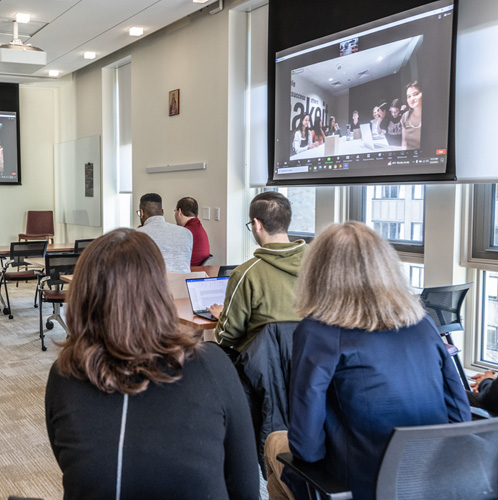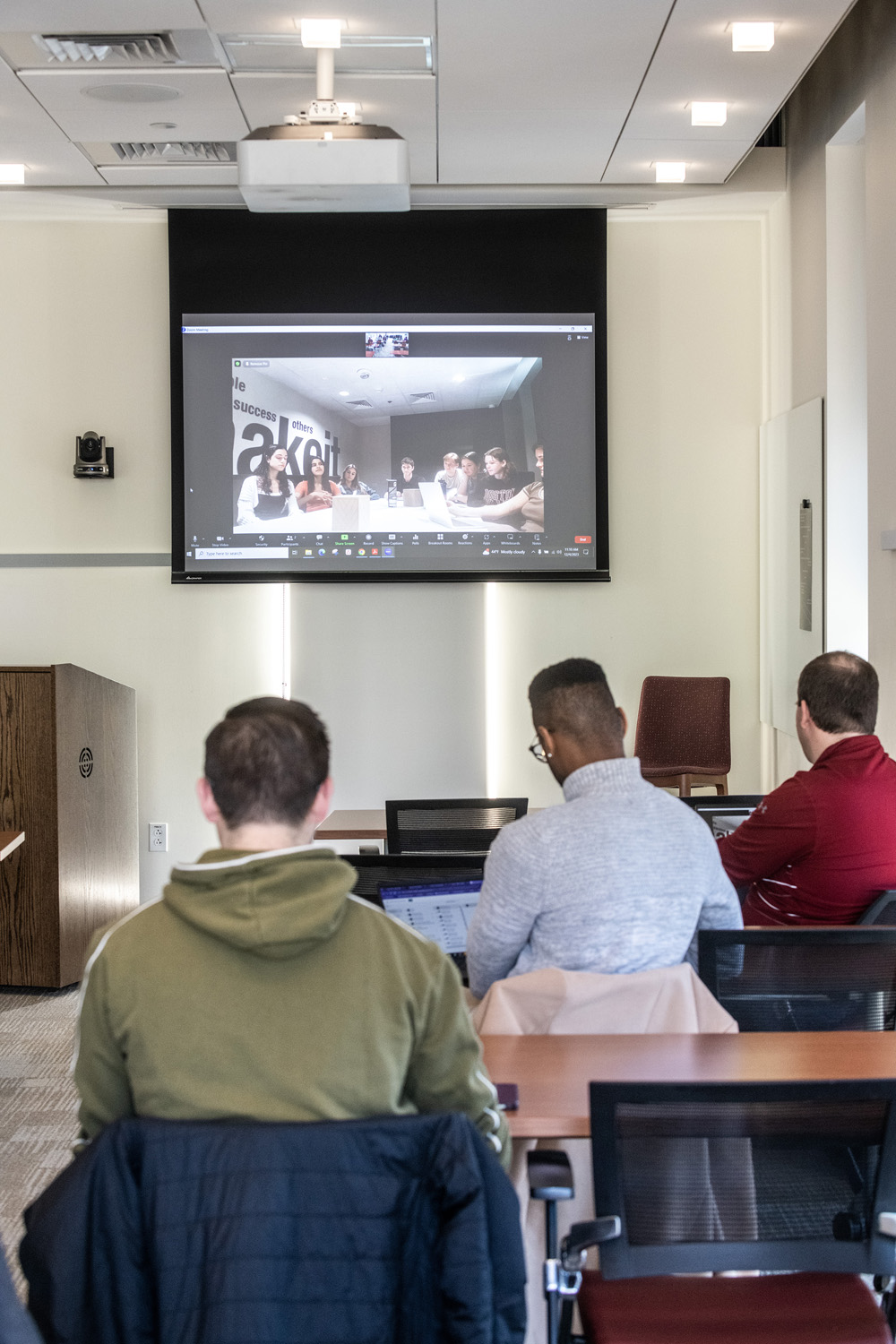
Dispatches from Dubai
Members of Boston College’s delegation to the world’s largest international climate change conference, COP28 U.A.E., discussed their experiences and took questions via live interactive Zoom sessions earlier this month, offering BC community members an opportunity to hear firsthand about proceedings. The December 4 and 11 “Dispatches from Dubai” were hosted by the Schiller Institute for Integrated Science and Society.
For the third consecutive year, the University is an official Observer Organization for the United Nations Climate Change Conference, or Conference of the Parties (COP). This highly influential annual global event—held this year from November 30 through December 12—serves as the center of global climate change policymaking.

BC delegates to COP28 shared their impressions of the first week of the conference on December 4. (Lee Pellegrini)
"‘Dispatches from Dubai’ are part of a series of programs that the Schiller Institute is hosting to extend the University's investment in sending our delegation to COP,” said Schiller Institute Seidner Family Executive Director Laura Steinberg, noting that the events allow the full BC community to benefit from the delegation's experience. “While the conference receives plenty of media coverage, we see tremendous value in BC faculty and students being able to hear directly from their peers,” she said.
On December 4, an engaging group of eight undergraduates, School of Social Work Assistant Professor María Piñeros-Leaño, and Lynch School of Education and Human Development Associate Dean Julia DeVoy, shared their impressions of the first week at the conference, as well as their insights, interests, and takeaways. While at COP28, the delegates attended high-level sessions with world leaders, smaller events tailored to specific topics, and debriefings by youth and research groups. They also explored pavilions hosted by the countries in attendance, and enjoyed the opportunity to visit Dubai.
At the dispatch session, delegates touched on climate change-related Issues including fossil fuels, greenhouse gases, and global water and food scarcity.
Gabriella D'Angelo ‘25, an environmental geoscience and economics major, was struck by “the sheer amount of people who are also passionate about same things. She called it “inspiring,” adding that she has gleaned ideas for career options and ways to get more involved in sustainability issues. Her Boston College ID tag, she said, prompted an approach by a representative of a nonprofit Cape Cod-based wildlife fund, with whom she spoke and exchanged contact information in hopes of collaborating on campus events.
“I’ve made connections and broadened my global perspective,” D'Angelo said.
Human centered engineering and economics major Leonard Alsleben ’26 had “preconceived notions” going into the conference, since it was held in Dubai and presided over by Sultan Al Jaber, chief executive of the United Arab Emirates' state oil company, Adnoc. But—given the focus on methane emissions, one of the most dangerous forms of greenhouse gas—Alsleben cited a pledge by 50 companies which represent half of global oil production, to reach near zero methane emissions by 2030 as an “ambitious but promising goal.”

The delegates touched on issues including fossil fuels, greenhouse gases, and global water and food scarcity. (Lee Pellegrini)
Piñeros-Leaño, the group's faculty lead—who also attended COP27—discussed highlights of her experience, noting in particular the inclusion for the first time of a day focused on health, which placed it "officially on the COP28 agenda."
She also spoke about a meeting that included U.S. Special Presidential Envoy for Climate John Kerry J.D. ’76, H '14, former Microsoft CEO Bill Gates, and World Health Organization Director General Tedros Adhanom Ghebreyesus. “It struck me that health was seen in a holistic view, including mental health," she said. "A lot of work needs to be done in this area.”
“Gender also takes a primary role this year,” added Piñeros-Leaño, “an effort to put women at the center of conversation, though decisions are still being made predominantly by males.” Former U.S. Secretary of State Hillary Clinton, she noted, highlighted the strength of women joining forces.
Dispatch attendees were eager to pose questions to the delegates. One asked about the group’s recurring discussion of the need for various sectors—those in STEM, with social science backgrounds, in politics, and others—to work together to solve global crises, and how this could play out.
In response, Lynch School of Education and Human Development Associate Dean of Undergraduate Students and Programs Julia DeVoy underscored the important role of the Schiller Institute in fostering and facilitating such collaboration.
“That’s the beauty of the Schiller Institute," she said. "These are complex problems and require multifaceted, multi-perspective, multi-modal approaches. Engineers have to talk to the social scientists, design thinkers have to talk to entrepreneurs. You can’t just have policy makers make policy without talking to environmentalists, psychologists, and others. We have to have a transdisciplinary set of approaches. That’s the only way to make progress.”
The session wrapped with two COP28 delegates headed to Dubai for the second week—among a group of four faculty members and six graduate students who participated in the December 11 dispatch—seeking advice from those who had navigated the first week of this large-scale event. Practical tips included packing clothing appropriate for hot weather as well as comfortable walking shoes, and a recommendation of where to find the best coffee (the Colombian pavilion).
Other members of the first-week delegates who participated in the first dispatch were: seniors Anna Davis, Emily Forand, Gabriela Levitt, Sophia Riordan, Jonathon Strang, and junior Sancia Sehdev.
COP28 week two delegates included School of Social Work Associate Professor Praveen Kumar, the faculty lead; Carroll School of Management Associate Professor Gergana Nenkov; Schiller Institute Professor of Climate Science and Society Yi Ming; Lynch School Assistant Professor Caitlyn Bolton; Kathleen Archibald M.S.W. ’24; Leila Ismaio J.D. ’25; Ji In Kim D.N.P ’25 of the Connell School of Nursing; Chanelle Robinson Ph.D. ’24 (Theology); Matthew Mersky Ph.D. ’25 (English); and Edwin Ward J.D./M.A. ’24.
The 20 COP28 delegates were chosen from a pool of some 300 applicants.
"Coordinating the BC delegation to COP aligns beautifully with the Schiller Institute's mission because the institute is the hub for interdisciplinary, cross-college activities on campus,” said Steinberg. “Climate change demands attention from each of us, and students and faculty from all schools and departments at BC are invited to join the delegation. Faculty and staff from many parts of the University make the final selection, a very difficult task when there are so many well-qualified, passionate applicants from BC who would like to attend."
BC delegates shared “day in the life” postings and photos for COP28 on the Schiller Institute’s Instagram: bcschillerinst.
